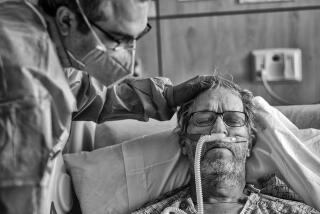Aid and Comfort
- Share via
In a darkened hospital room, David Walker quietly sits at the bedside of Sammie Haynes.
Haynes, who is 77, has been blind since he was 45. Recently, he underwent heart surgery, but now has pneumonia. His wife has left for a while, and until Walker arrived, the one-time catcher for the legendary Satchel Paige, was alone.
The two men chat amicably at first. Walker asks Haynes how he is doing, and he replies the hospital food isn’t as good as his wife’s cooking.
They talk a little longer, then Walker asks Haynes how his spirits are holding up.
“I’ll be here as long as the Lord wants me here,” said Haynes. “I’m not worried. I’m comfortable.” (He later recovered from the illness.)
The two men hold hands and pray, and shortly thereafter, say goodbye.
For Walker, who does many other deeds at Good Samaritan Hospital, the afternoon visit is really the heart and soul of his work. As an Episcopal priest and the hospital’s chaplain, he’s on 24-hour call to comfort the sick, and sometimes the dying.
It’s an extremely taxing job, particularly on his emotions. Children in oncology units. Heart patients headed for surgery, who speak of their fears about great pain and death. Families unable to accept that a loved one has a terminal disease.
But Walker appears to maintain the most upbeat of dispositions as he goes about visiting patients, counseling staff, and leading daily church services at the hospital’s chapel.
“It’s hard not to bring the emotional trauma home with you,” said Walker. “But I can’t carry it around with me at home or I couldn’t come back here and do my work.”
In his seven years as hospital chaplain, Walker has earned a reputation among hospital physicians and administrators for his sensitivity and skill in handling wrenching emotional moments.
“There’s no one I’d rather have around when a patient or a family is in trouble,” said Dr. David Cannom, the hospital’s director of cardiology.
Even though Good Samaritan is affiliated with the Episcopal Church, the hospital and Walker do not promote any particular faith. Indeed, Walker only visits patients who request a clerical visit.
“I will always ask them if they want to pray, but I’m not there to evangelize,” he said. “I’m there to meet their needs.”
Jeanie Stillwell Haye, 59, can attest to that. In March, her husband underwent back surgery and stayed at Good Samaritan for eight days. The Hayes, who live in the small desert community of Ridgecrest, were apprehensive about the big city, but Walker eased the transition.
He brought them a prayer book, ministered an in-room communion, and was there the morning of the surgery.
“He always stayed for a polite length of time,” said Haye. “He was what someone recovering from surgery needed. He has the gift of warmth and support.”
Other patients who seek spiritual counsel need look no further than their television set. Walker founded the hospital’s channel 6, which broadcasts his noontime service live from the chapel Monday through Friday, and replays it throughout the day.
For the live broadcast, Walker wears his wireless microphone and directs the show by choosing camera angles with a special control panel as he delivers the sermon. Of course, with his sophisticated system, he could just as easily prerecord all his services, but he says he won’t do that.
“People find it comforting that it’s being done live,” said Walker. “They know it’s not artificial, and that’s important.”
More to Read
Sign up for Essential California
The most important California stories and recommendations in your inbox every morning.
You may occasionally receive promotional content from the Los Angeles Times.













